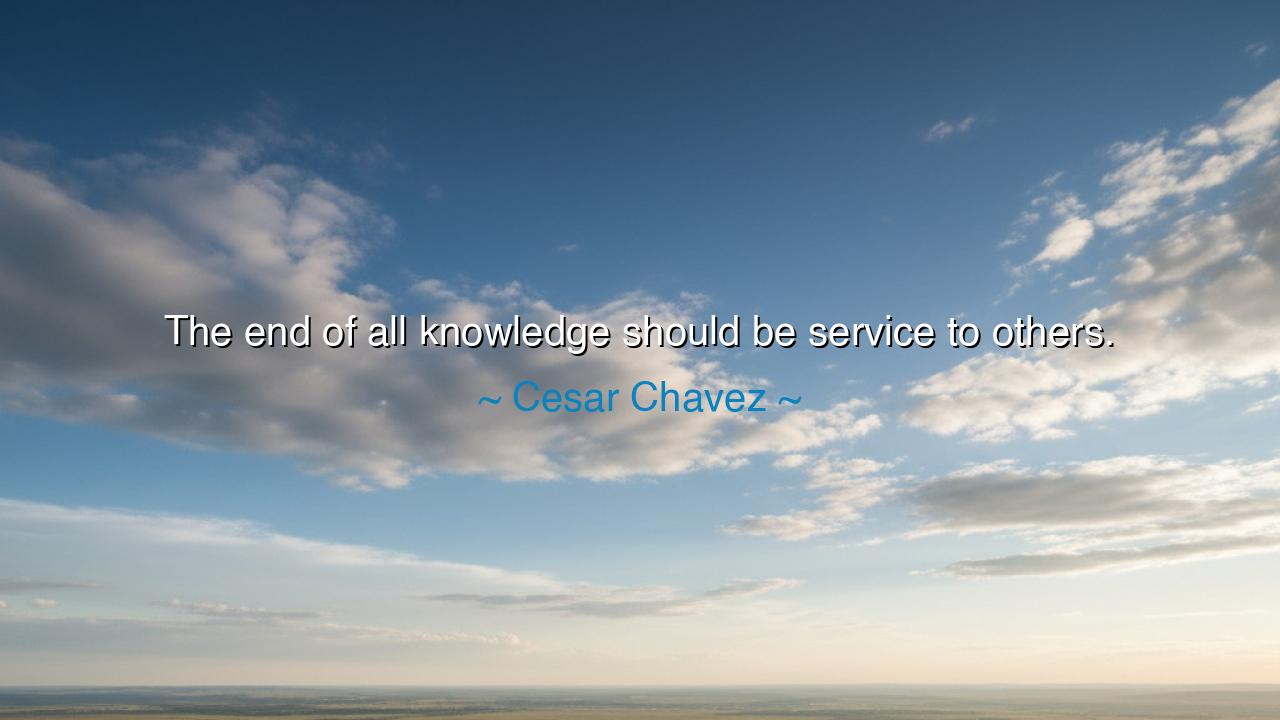
The end of all knowledge should be service to others.






Hear the words of César Chávez, servant of the people and voice of the laborer, who declared: “The end of all knowledge should be service to others.” These words shine with the brilliance of moral clarity, for they remind us that wisdom without compassion is barren, and learning without generosity is a hollow crown. The true purpose of knowledge is not to exalt the self, nor to accumulate power, but to lift the burdens of the weak, to heal the wounded, and to guide the lost.
To seek knowledge for its own sake may bring delight to the curious mind, yet if it never passes into service, it becomes self-indulgence. Chávez, who lived among the fields and marched with the workers, knew that the value of what we learn is measured not in prestige but in usefulness. Books, skills, inventions—these are not treasures to hoard, but tools to be wielded in the cause of justice and mercy. True greatness, then, lies not in knowing much, but in serving much.
History gives us clear examples. Consider Florence Nightingale, who did not let her knowledge of medicine remain in the lecture hall. She carried it into the horrors of war, where her care saved thousands and transformed the practice of nursing. Her service gave meaning to her studies, and her legacy endures not because she learned, but because she served. So too with Gandhi, who joined his knowledge of law with the service of his people, becoming a leader who sought not wealth or acclaim, but the freedom of millions.
Chávez himself embodied this principle. Born into poverty, he knew the harsh life of the farmworker. Yet he did not use the knowledge he gained from struggle to escape alone; he turned it back toward his people. He organized, he taught, he inspired, and he gave his life to the service of those who bent their backs in the fields. His wisdom was not stored away like gold, but shared freely like bread among the hungry. This is why his words carry such weight—because they were lived.
The meaning of his saying is thus revealed: every bit of learning, every skill acquired, every truth discovered must find its completion in service. Knowledge without service is like a lamp hidden under a basket; its light shines nowhere. Service gives knowledge its true radiance, for in serving we prove that what we have learned has value, and in giving, we discover the noblest purpose of our own lives.
The lesson for us is clear: if you are a student, do not ask only, “What can I gain from this?” Ask, “Whom can I help with this?” If you are a worker, do not measure your skills only by the wage they bring, but by the good they do for others. If you are a leader, let your wisdom be tested not by speeches or plans, but by the service you render to the least of your people. For only then does knowledge rise above vanity and take its rightful place as a force for good.
And what practical steps must we take? Share what you know freely—teach a child, guide a colleague, uplift a stranger. Use your talents not only for profit but for the betterment of your community. Seek opportunities where your knowledge can lighten another’s load. And remember, service is not reserved for the mighty; even the smallest act of kindness, rooted in understanding, fulfills Chávez’s vision.
Thus let these words echo across the ages: “The end of all knowledge should be service to others.” Carry this teaching in your heart, for it is both compass and command. In following it, you will find that your life does not shrink by giving, but grows vast, radiant, and eternal—because the greatest wisdom is love in action.






AAdministratorAdministrator
Welcome, honored guests. Please leave a comment, we will respond soon